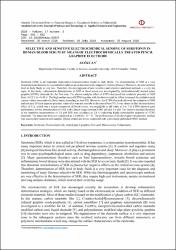Selective and Sensitive Electrochemical Sensing of Serotonin in Human Blood Serum By Means of Electrochemically Treated Pencil Graphite Electrode
Abstract
Serotonin (SER) is an important monoamino-neurotransmitter found in body fluids. The determination of SER is a very important issue because its concentration behaves as an indicator in the diagnosis of many illnesses. Moreover, its concentration level in body fluids is very low. Therefore, the development of new sensitive and selective analytical methods is a very hot topic. In this study, voltammetric determination of SER in blood serum was investigated by electrochemically treated pencil graphite (ETPG) electrode for the first time. The electro-catalytic effect of ETPG decreased the oxidation potential of SER from +0.52 V to +0.48 V. The high surface area of ETPG together with its electro-catalytic effect increased the oxidation peak current values tremendously (forty times) according to bare PG. Moreover, the ETPG electrode allowed the oxidation of SER and uric acid (UA) at separate potential values that was not possible in the case of bare PG. It was observed that the interference effect of UA, which was a major component of blood serum, was negligible at pH value of 1.6. The ETPG showed good performance for the determination of SER with a linear range between 0.005 ?M and 1.0 ?M. The relative standard deviation of ten repetitive measurements of 1.0 ?M SER was calculated as 2.8 % indicating highly reproducible response of ETPG electrode. The detection limit was calculated as 1.0 nM (S / N = 3). The performance of the developed voltammetric method was successfully tested in real samples (blood serum) and it was compared with a previously published HPLC method Serotonin (SER) is an important monoamino-neurotransmitter found in body fluids. The determination of SER is a very important issue because its concentration behaves as an indicator in the diagnosis of many illnesses. Moreover, its concentration level in body fluids is very low. Therefore, the development of new sensitive and selective analytical methods is a very hot topic. In this study, voltammetric determination of SER in blood serum was investigated by electrochemically treated pencil graphite (ETPG) electrode for the first time. The electro-catalytic effect of ETPG decreased the oxidation potential of SER from +0.52 V to +0.48 V. The high surface area of ETPG together with its electro-catalytic effect increased the oxidation peak current values tremendously (forty times) according to bare PG. Moreover, the ETPG electrode allowed the oxidation of SER and uric acid (UA) at separate potential values that was not possible in the case of bare PG. It was observed that the interference effect of UA, which was a major component of blood serum, was negligible at pH value of 1.6. The ETPG showed good performance for the determination of SER with a linear range between 0.005 ?M and 1.0 ?M. The relative standard deviation of ten repetitive measurements of 1.0 ?M SER was calculated as 2.8 % indicating highly reproducible response of ETPG electrode. The detection limit was calculated as 1.0 nM (S / N = 3). The performance of the developed voltammetric method was successfully tested in real samples (blood serum) and it was compared with a previously published HPLC method
Source
Anadolu Üniversitesi Bilim ve Teknoloji Dergisi :A-Uygulamalı Bilimler ve MühendislikVolume
17Issue
3URI
http://www.trdizin.gov.tr/publication/paper/detail/TWpBMU5Ua3lNZz09https://hdl.handle.net/11421/17926


















